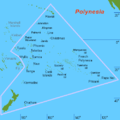Polynesia
Polynesia is a subregion of Oceania, made up of more than 1,000 islands scattered over the central and southern Pacific Ocean. The indigenous people who inhabit the islands of Polynesia are termed Polynesians, sharing many similar traits including language family, culture, and beliefs.
History[edit]
Historically, the islands of Polynesia have been inhabited for many centuries, with the Polynesian cultural sphere developed over a period of thousands of years. The first settlers of Polynesia are believed to have arrived in the islands via canoe, navigating using the stars and other natural signs.
Geography[edit]
Polynesia is characterized by a small amount of land spread over a very large portion of the mid and southern Pacific Ocean. It includes three island groups: Hawaii, New Zealand, and Easter Island, all of which are located at the corners of the Polynesian Triangle.
Culture[edit]
Polynesian culture is strongly tied to the natural environment. Traditional practices and knowledge are passed down through generations and include navigation, fishing, and agriculture techniques. Polynesian languages are part of the larger Austronesian language family.
Demographics[edit]
The population of Polynesia is estimated to be around 680,000, spread across a vast area of the Pacific Ocean. The most populous Polynesian countries are New Zealand, Hawaii, and French Polynesia.
See also[edit]
References[edit]
<references />
External links[edit]
|
|
|
| Polynesia | ||||||
|---|---|---|---|---|---|---|
|
| Oceania | ||||||
|---|---|---|---|---|---|---|
|
-
Polynesia
-
Polynesia
-
Polynesia
-
Polynesia
-
Moorea baie cook
-
Mokoliʻi Insel
-
Polynesian Migration
-
Ahu Tongariki
-
Chronological dispersal of Austronesian people across the Pacific
-
Views of the South Seas
-
Temple du Roi dans la baie Tiritatéa
-
Entrevue de l'expedition de M. Kotzebue avec le roi Tammeamea dans l'ile d'Ovayhi, Iles Sandwich
Ad. Transform your life with W8MD's Budget GLP-1 injections from $75


W8MD offers a medical weight loss program to lose weight in Philadelphia. Our physician-supervised medical weight loss provides:
- Weight loss injections in NYC (generic and brand names):
- Zepbound / Mounjaro, Wegovy / Ozempic, Saxenda
- Most insurances accepted or discounted self-pay rates. We will obtain insurance prior authorizations if needed.
- Generic GLP1 weight loss injections from $75 for the starting dose.
- Also offer prescription weight loss medications including Phentermine, Qsymia, Diethylpropion, Contrave etc.
NYC weight loss doctor appointmentsNYC weight loss doctor appointments
Start your NYC weight loss journey today at our NYC medical weight loss and Philadelphia medical weight loss clinics.
- Call 718-946-5500 to lose weight in NYC or for medical weight loss in Philadelphia 215-676-2334.
- Tags:NYC medical weight loss, Philadelphia lose weight Zepbound NYC, Budget GLP1 weight loss injections, Wegovy Philadelphia, Wegovy NYC, Philadelphia medical weight loss, Brookly weight loss and Wegovy NYC
|
WikiMD's Wellness Encyclopedia |
| Let Food Be Thy Medicine Medicine Thy Food - Hippocrates |
Medical Disclaimer: WikiMD is not a substitute for professional medical advice. The information on WikiMD is provided as an information resource only, may be incorrect, outdated or misleading, and is not to be used or relied on for any diagnostic or treatment purposes. Please consult your health care provider before making any healthcare decisions or for guidance about a specific medical condition. WikiMD expressly disclaims responsibility, and shall have no liability, for any damages, loss, injury, or liability whatsoever suffered as a result of your reliance on the information contained in this site. By visiting this site you agree to the foregoing terms and conditions, which may from time to time be changed or supplemented by WikiMD. If you do not agree to the foregoing terms and conditions, you should not enter or use this site. See full disclaimer.
Credits:Most images are courtesy of Wikimedia commons, and templates, categories Wikipedia, licensed under CC BY SA or similar.
Translate this page: - East Asian
中文,
日本,
한국어,
South Asian
हिन्दी,
தமிழ்,
తెలుగు,
Urdu,
ಕನ್ನಡ,
Southeast Asian
Indonesian,
Vietnamese,
Thai,
မြန်မာဘာသာ,
বাংলা
European
español,
Deutsch,
français,
Greek,
português do Brasil,
polski,
română,
русский,
Nederlands,
norsk,
svenska,
suomi,
Italian
Middle Eastern & African
عربى,
Turkish,
Persian,
Hebrew,
Afrikaans,
isiZulu,
Kiswahili,
Other
Bulgarian,
Hungarian,
Czech,
Swedish,
മലയാളം,
मराठी,
ਪੰਜਾਬੀ,
ગુજરાતી,
Portuguese,
Ukrainian













